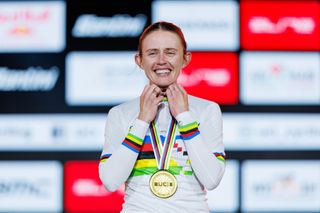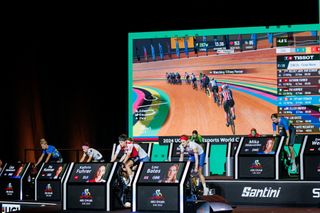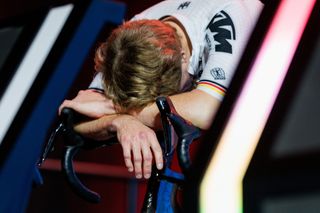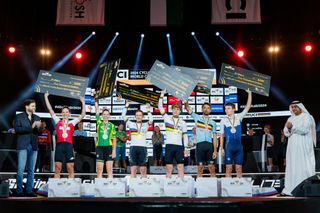
On October 26, 2024, the world’s best cycling esports athletes converged in Abu Dhabi, UAE, for a groundbreaking UCI Cycling Esports World Championship final held at the grand ADNEC Marina Hall. With a live audience and broadcast coverage, it was a momentous occasion—a first-of-its-kind event that took virtual cycling out of basements, living rooms and training studios and catapulted it onto the global stage.
For years now, esports has had an identity crisis with no personality behind the avatars, but that was solved here. Hundreds came out to the waterfront venue to witness the spectacle complete with lights, pyrotechnics and confetti falling from the ceiling. Spectators lept to their feet, cheering and shouting encouragements to the 42 competitors, eager to participate in the thrill of racing up close.
Unlike traditional cycling events, the audience didn’t hear the crescendo of buzzing wheels or feel the wind sweep their faces as a peloton whizzed by. What they got instead was an immersive, front-row view of the agony and ecstasy of bike racing.
Fans could see every gritty detail: sweat glistening on brows, muscles straining and faces contorting in effort as the racers pushed themselves to their limits. A live scoreboard kept the crowd riveted to the standings, mic’d up commentators relayed tactics and outcomes, and among those invited by the virtual cycling platform, MyWhoosh, Peter Sagan could be heard cheering, thoroughly enthralled by the action.
The UCI’s Esports Coordinator, Jacob Fraser, had hoped for a thrilling showcase of cycling’s newest frontier, and the riders delivered in spades. The racing was tactical, aggressive, and as the men’s winner Jason Osborne of Germany later put it, “brutally hard.”
The championship consisted of three punishing stages, with both the men’s and women’s champions left undecided until the very last climb of the final race.
In the men’s race, Osborne was joined on the podium by Lionel Vujasin of Belgium in second place and Kasper Borremans of Finland in third. Mary Kate McCarthy of New Zealand triumphed in the women’s event, followed by Gabriela Guerra of Brazil in a close second place and Kathrin Fuhrer of Switzerland in third.
The latest race content, interviews, features, reviews and expert buying guides, direct to your inbox!
As the confetti settled, both winners received the coveted rainbow jerseys—both a physical version and a virtual one for their avatars—as well as US$15,000 each from a total prize pool of US$60,000.
“What a spectacular event it was,” raved UCI President David Lappartient. “Thank you to MyWhoosh for an excellent organisation and for delivering this new format, with all finalists racing together on stage, pushing each other to the maximum and taking the discipline of cycling esports to a whole new level. We already look forward to returning to Abu Dhabi for the next editions, and continue to work with MyWhoosh to further develop this fascinating and innovative discipline.”
How the racing unfolded
(Image credit: SW Pix)
Jason Osborne of Germany is a former Olympic Rowing medalist and the inaugural 2020 Cycling Esports World Champion. In fact, he has never finished off the podium. However, to repeat, he would have to overcome a slow start in the first race of the three-stage points format, “The Sprint.”
Osborne made his decisive move in the second race, powering away from the field in “The Strategist,” and punctuated his second world championships with a solo attack in the final “All-Out” stage.
Osborne’s aggressive signature style secured victory, scoring 177 points, while Belgium’s Lionel Vujasin finished closely behind with 174 points. 18-year-old Fin Kasper Borremans claimed the bronze medal with 164 points, and 2023 world champion Bjorn Andreassen from Denmark took fourth place with 154 points. The USA’s Hayden Pucker rounded out the top five with 145 points.
Osborne recently stepped away from his WorldTour team Alpecin Deceuninck to focus solely on esports. Winning a second rainbow jersey affirmed his decision, as he stated after the win, “It’s time to move on to what I enjoy most, and that is ecycling, and today I made the most of my decision.”

(Image credit: SW Pix)
Mary Kate McCarthy made an early statement in “The Sprint,” securing maximum points with a perfectly timed effort. However, the hard-fought victory over the tightly packed elite women’s field remained uncertain until the final sprint to the line of the “All Out,” winning with 180 points.
Brazil’s Gabriela Guerra overcame a sub-par Sprint performance to challenge until the final meters, ultimately falling short in her attempt to win the world title by just 4 points.
Switzerland’s Kathrin Fuhrer finished third with 165 points after a courageous ride. Great Britain’s Maria Holdcroft and Lou Bates claimed fourth and fifth each with 156 points, missing out on the medals despite all being in contention in the waning nail biting moments.
The New Zealander fended off performance authenticity questions after an annulment in a recent elite esports race, saying, “I had a point to prove this week.” Making a statement while riding a UCI standardized smart trainer in a live setting dispelled doubts that plague the developing sport.
Stage One

(Image credit: SW Pix)
The three-stage points format created a compelling competition that had the arena crowd on their feet cheering while vicariously experiencing the visceral suffering of the beautiful athletic brutality of this unique cycling discipline.
In the first stage, racers had fifteen minutes to post their fastest time through a 300-meter segment of the 1.7-kilometer circuit. The women’s race was strikingly straightforward. The riders rolled from the pen at a pedestrian pace and used the group’s draft benefit to post the race’s fastest times in the lap one segment.
McCarthy claimed maximum points (20), followed by Bates (19) and Fuhrer (18). Holdcroft finished in fifth to claim 16 points, and Guerra had serious ground to cover, taking only seven points with a disappointing 14th-best sprint.
The men’s race was a tactical affair that the three-man USA squad perfectly executed. They stayed behind as the group exited the start, creating a virtual track stand to ensue and leaving the field wondering what to do. It was too late to react when the American sprint train rolled through.
The USA’s Neal Fryett took the top sprint points, followed by teammates Hayden Pucker and Zach Nehr. Borremans claimed 15 points in sixth, Vujasin took 13 points, finishing eighth, and Andreassen finished in 12th to take nine points.
Stage Two

Eventual winner Jason Osborne said the racing was ‘brutally hard’
(Image credit: SW Pix)
Stage two included a 9-kilometre circuit featuring a roughly 4-minute climb at 2.1 kilometres, followed by a 1-kilometre flat stretch to the finish line. Points were available at the base and top of the climb, with double points awarded at the finish.
After a surprisingly steady start, Britain’s Lou Bates struck out to secure maximum points at the first sprint point at the base of the 2.1 km climb. McCarthy and Guerra, taking a more reserved approach, surged past Bates and distanced themselves at the summit. Guerra took maximum points, followed by McCarthy, creating a gap of nearly 20 seconds.
As they approached the finish, the chase group, including Bates, Holdcroft, and Fuhrer, lost significant time to the leaders. With no risk of being caught, Guerra and McCarthy engaged in a cat-and-mouse game during the final kilometer. Guerra made her move with 500 meters to go, but McCarthy couldn’t respond, finishing second, while Holdcroft claimed third.
After two stages, the Women’s standings were as follows:
Guerra: 74 points
McCarthy: 69 points
Brunee: 63 points
Bates: 63 points
Holdcroft: 59 points
Fuhrer: 54 points
The cream rose to the top on the lower slopes of the climb in the Men’s second stage as Osborne powered away from the group, reaching the Climb Checkpoint with seconds to spare. He extended his lead on the descent while a two-man chase, including Vujasin and Andreassen, pursued. A third group of Pucker and Harris (Australia) trailed a few seconds behind.
Osborne soloed to the finish, with Vujasin besting Andreassen for second place and Pucker securing the points from Harris in a strong sprint performance. Borremans made up ground to finish seventh.
Overall Standings after the Men’s Stage 2 were:
Vujasin: 86 points
Osborne: 80 points
Pucker: 72 points
Harris: 69 points
Borremans: 69 points
Mehl (Norway): 66 points
Andreassen: 65 points
Stage Three

Peter Sagan enjoying the race action
(Image credit: SW Pix)
The sharp 12-percent 50-second climb to the start/finish line was the pivotal point in the third and final four-lap hilly criterium-style race for the Women’s and Men’s fields. Climb Segment points were offered for the first three laps and double points at the finish.
Bates again applied pressure early and attacked the first climb to claim the maximum 20 points in the sprint.
On the second lap, Switzerland’s Kathrin Fuhrer made her decisive move to take the hilltop sprint, while contenders Guerra and McCarthy steadily amassed points.
Guerra took the sprint on lap three, and McCarthy rolled over in third, separating them by only two points and setting the stage for an epic finish in which any of the racers in the top five had a chance to win.
In a dramatic last-second finish featuring a two-up battle to the line, McCarthy agonizingly distanced herself to cross the line first, pouring her body over the bars of her bike in exhaustion, with Guerra finishing second and Fuhrer taking the bronze.
In the Men’s final stage, Kasper Borremans attacked the first-lap climb to earn maximum points and begin his podium campaign. Osborne trailed Vujasin by eight points as their group, which included Andreassen, went through the start/finish of lap one.
Osborne took firm control of the race in the second lap, extending his ten-second gap at the base of the climb to claim the points at the summit and never looked back. Vujasin finished fourth in the sprint to secure 17 points and maintain a five-point lead.
In lap three, Osborne steadily and methodically extended his lead. Vujasin finished fifth and narrowed the gap to just one point. But in the end Osborne’s strength was too much.
There was no doubt as he triumphantly punched the air in victory, crossing the line solo with twenty seconds to celebrate his second World Title. Borremans overtook Vujasin to secure the podium placings.

(Image credit: SW Pix)
The first-ever live event proved to be a proper World Championship for cycling esports, crowning two deserving champions in New Zealand’s McCarthy and Germany’s Osborne, and marked a significant step forward in the evolution of the discipline.

